Meditation techniques enhance mindfulness, focus, and emotional balance, addressing common challenges like distractions and emotional resistance. This article explores various methods, including mindfulness and loving-kindness meditation, tailored practices for different populations, and emerging trends such as technology integration and community engagement. Each technique offers unique benefits, promoting self-awareness and resilience for improved mental well-being.
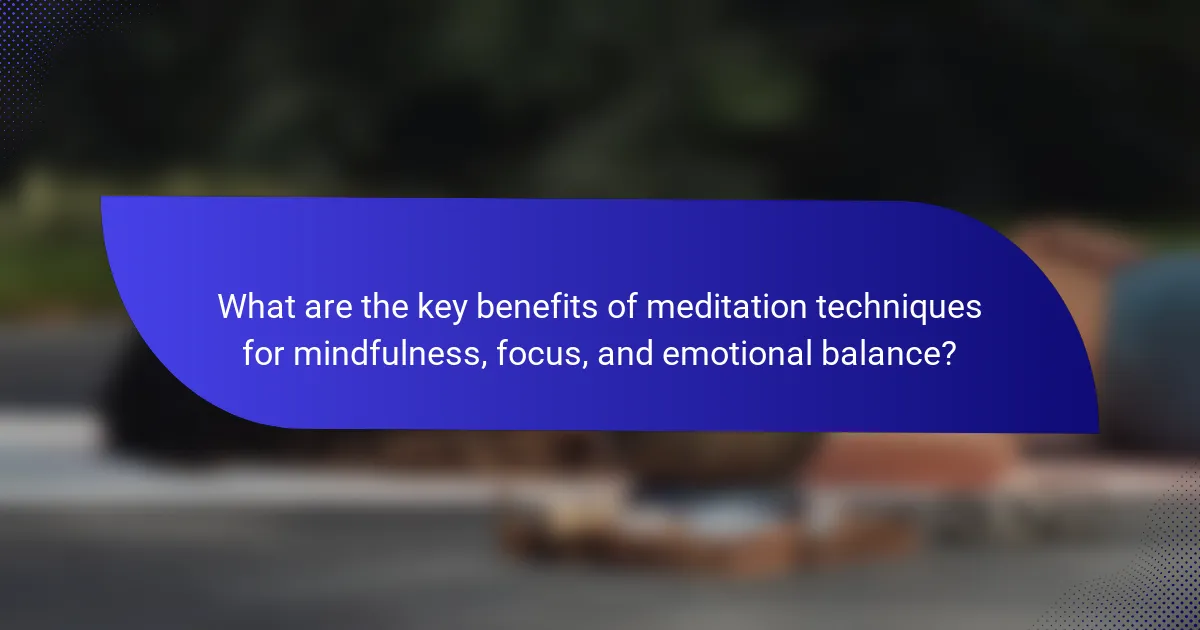
What are the key benefits of meditation techniques for mindfulness, focus, and emotional balance?
Meditation techniques enhance mindfulness, focus, and emotional balance by promoting self-awareness and reducing stress. Key benefits include improved concentration, emotional regulation, and increased resilience. Research indicates that regular practice can lead to structural changes in the brain, enhancing areas related to attention and emotional control. Additionally, meditation fosters a sense of inner peace, allowing individuals to navigate challenges more effectively.
How does meditation enhance emotional well-being?
Meditation significantly enhances emotional well-being by promoting mindfulness, focus, and emotional balance. Regular practice reduces stress, anxiety, and depression, fostering a positive mindset. Studies show that mindfulness meditation increases emotional regulation, enabling individuals to respond to challenges with greater resilience. Additionally, focused breathing techniques can lead to reduced levels of cortisol, the stress hormone, improving overall emotional health.
Which meditation techniques improve focus and concentration?
Meditation techniques that enhance focus and concentration include mindfulness meditation, focused attention meditation, and transcendental meditation. These practices train the mind to maintain attention and reduce distractions.
Mindfulness meditation encourages awareness of the present moment, improving cognitive flexibility. Focused attention meditation involves concentrating on a single object, which sharpens mental clarity. Transcendental meditation, with its unique mantra repetition, enhances brain coherence and promotes deeper concentration.
Research indicates that regular practice of these techniques can lead to structural brain changes, enhancing areas related to attention and executive function. For instance, mindfulness meditation has been linked to increased gray matter density in the hippocampus, which is crucial for memory and focus.
What role does mindfulness play in stress reduction?
Mindfulness significantly reduces stress by enhancing emotional regulation and focus. Practicing meditation techniques fosters awareness of the present moment, which alleviates anxiety. Studies show that consistent mindfulness practice can decrease cortisol levels, the primary stress hormone. Techniques such as breath awareness and body scanning promote relaxation, leading to improved mental clarity and emotional balance.
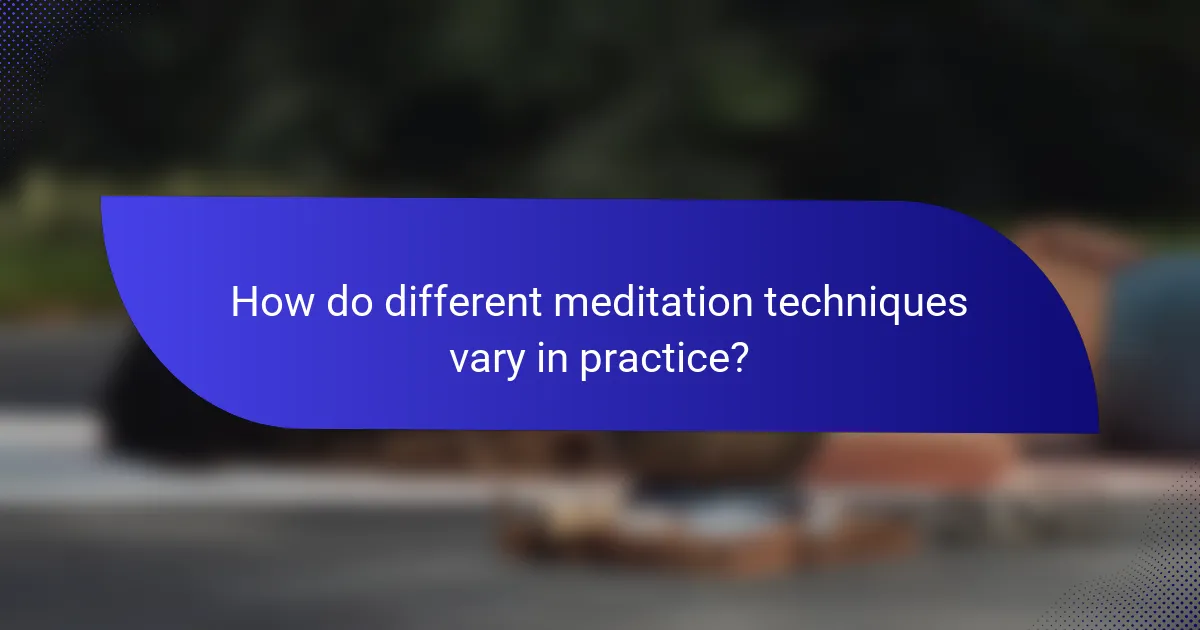
How do different meditation techniques vary in practice?
Different meditation techniques vary significantly in practice, each offering unique methods for enhancing mindfulness, focus, and emotional balance. Techniques like mindfulness meditation promote present-moment awareness, while focused attention meditation trains concentration on a single object or thought. Loving-kindness meditation fosters emotional balance through compassion toward oneself and others. Transcendental meditation involves repeating a mantra to achieve a deep state of relaxation. Each method has distinct benefits, making it essential to choose one that aligns with individual goals and preferences.
What is the difference between guided and unguided meditation?
Guided meditation involves following a leader’s instructions, while unguided meditation allows for personal exploration. Guided techniques enhance mindfulness and emotional balance through structured sessions, often featuring visualization or specific themes. Unguided practices promote self-direction, fostering deeper focus and individual insight. Both approaches serve valuable roles in cultivating mental well-being.
Which meditation techniques are best for beginners?
Breathing exercises, body scan, and guided meditation are ideal for beginners seeking mindfulness, focus, and emotional balance. Breathing exercises enhance awareness of the present moment, while body scans promote relaxation. Guided meditations provide structured experiences that help beginners stay engaged. Each technique supports emotional regulation and stress reduction, fostering a balanced mental state.
How do cultural influences shape meditation practices?
Cultural influences significantly shape meditation practices by integrating local beliefs, traditions, and values. Different cultures adapt meditation techniques to align with their spiritual or philosophical frameworks. For example, mindfulness meditation in Western contexts often emphasizes stress reduction, while Eastern traditions may focus on enlightenment and self-awareness.
Cultural backgrounds also determine the forms of meditation practiced. In India, yoga and meditation are intertwined with Hindu and Buddhist philosophies. In contrast, Western approaches might incorporate modern psychological principles. These adaptations highlight the unique attributes of meditation practices across cultures.
Moreover, community practices can impact meditation styles. Group meditations in Japan emphasize harmony and collective experience, while individual practices are more common in Western settings. This variation illustrates how rare attributes influence the meditation experience based on cultural context.
Ultimately, understanding these cultural influences enriches the practice of meditation, allowing individuals to choose techniques that resonate with their personal beliefs and societal norms.
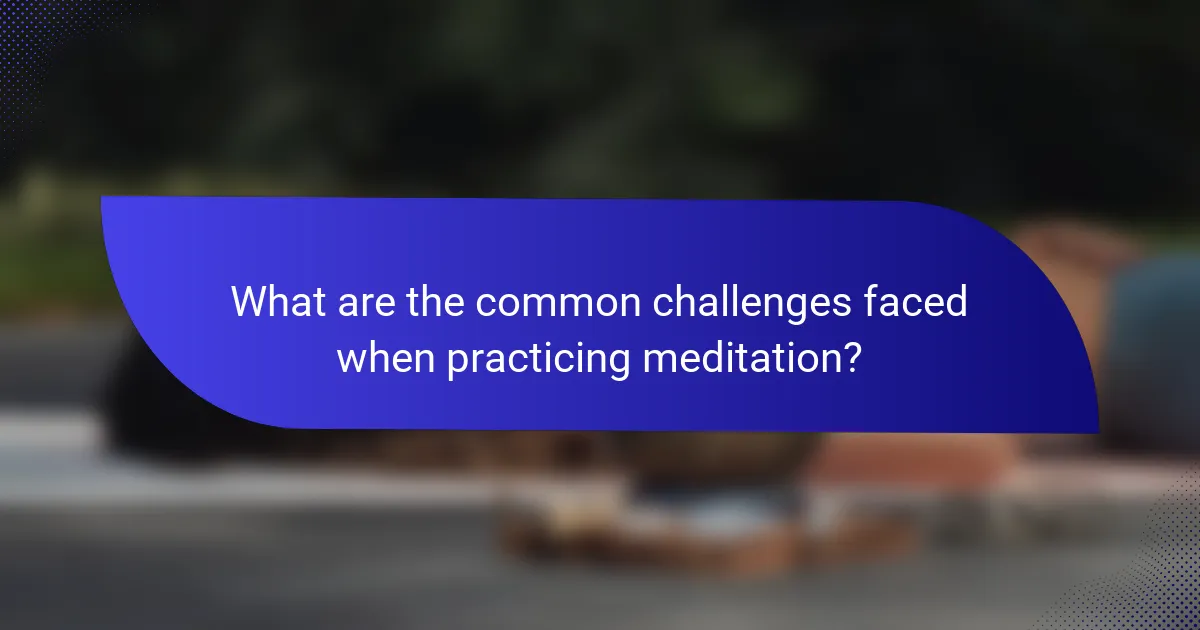
What are the common challenges faced when practicing meditation?
Common challenges when practicing meditation include distractions, difficulty in maintaining focus, physical discomfort, and emotional resistance. Beginners often struggle with a wandering mind, making it hard to achieve mindfulness. As practitioners advance, they may encounter deeper emotional issues that surface during meditation, impacting their emotional balance. Consistency is another challenge, as establishing a regular practice requires commitment. Each of these challenges can hinder the effectiveness of meditation techniques aimed at improving mindfulness and focus.
How can distractions affect meditation effectiveness?
Distractions significantly reduce meditation effectiveness by disrupting focus and emotional balance. They can lead to wandering thoughts, making it difficult to achieve mindfulness. Techniques to enhance meditation include creating a quiet space, using guided sessions, and practicing breath awareness. These strategies help minimize distractions and improve overall meditation outcomes.
What strategies can help overcome common meditation obstacles?
To overcome common meditation obstacles, incorporate specific strategies that enhance mindfulness and focus. Establish a consistent routine to build habit and familiarity. Use guided meditations to provide structure and reduce distractions. Set realistic expectations to avoid frustration and cultivate patience. Experiment with different techniques, such as breath awareness or body scans, to find what resonates with you. Lastly, create a dedicated space free from interruptions to enhance emotional balance and promote a serene environment.
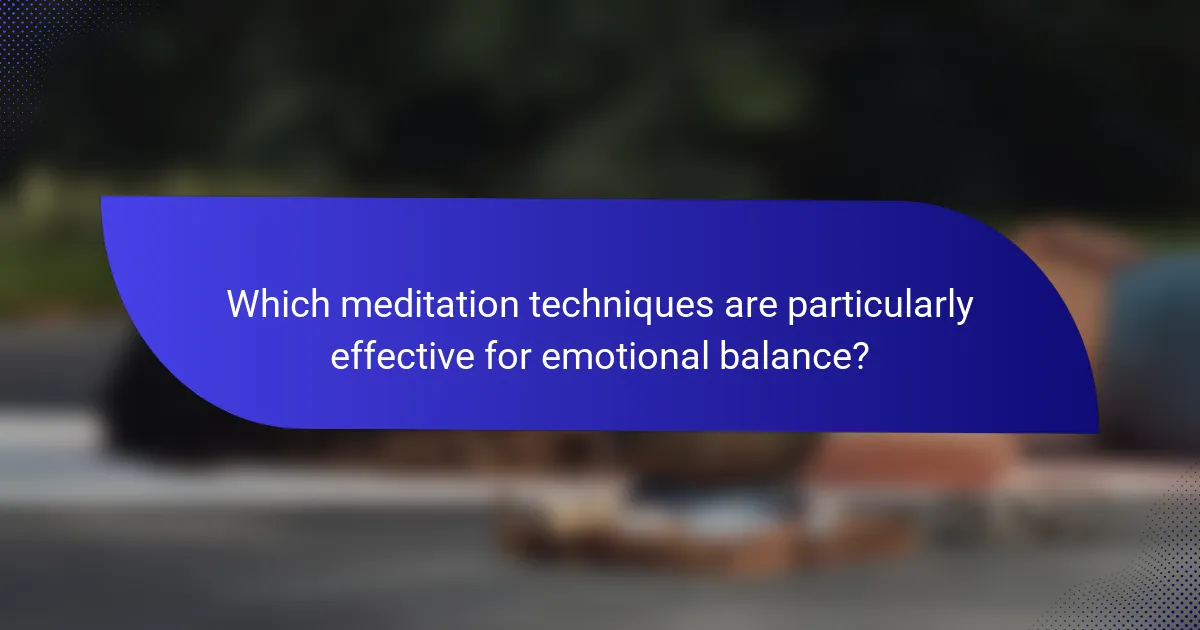
Which meditation techniques are particularly effective for emotional balance?
Mindfulness meditation, loving-kindness meditation, and body scan meditation are particularly effective for emotional balance. These techniques promote awareness, compassion, and relaxation, helping to regulate emotions and reduce stress. Mindfulness meditation enhances present-moment awareness, while loving-kindness meditation fosters positive feelings towards oneself and others. Body scan meditation encourages physical awareness, which can alleviate emotional tension. Regular practice of these techniques contributes to improved emotional stability and resilience.
How does loving-kindness meditation foster emotional resilience?
Loving-kindness meditation enhances emotional resilience by fostering compassion and reducing negative emotions. This technique encourages individuals to cultivate positive feelings towards themselves and others, which strengthens emotional stability. Research indicates that regular practice leads to increased levels of positive emotions and improved coping mechanisms during stress. Additionally, loving-kindness meditation can enhance self-acceptance, further contributing to emotional balance.
What is the impact of body scan meditation on emotional awareness?
Body scan meditation significantly enhances emotional awareness by promoting mindfulness and self-reflection. This technique encourages individuals to focus on bodily sensations, fostering a deeper connection to their emotions. As a result, practitioners often report increased emotional regulation and clarity. Studies indicate that regular practice can lead to a 30% improvement in emotional awareness, highlighting its effectiveness. Additionally, body scan meditation can reduce anxiety and stress, further contributing to emotional balance and well-being.
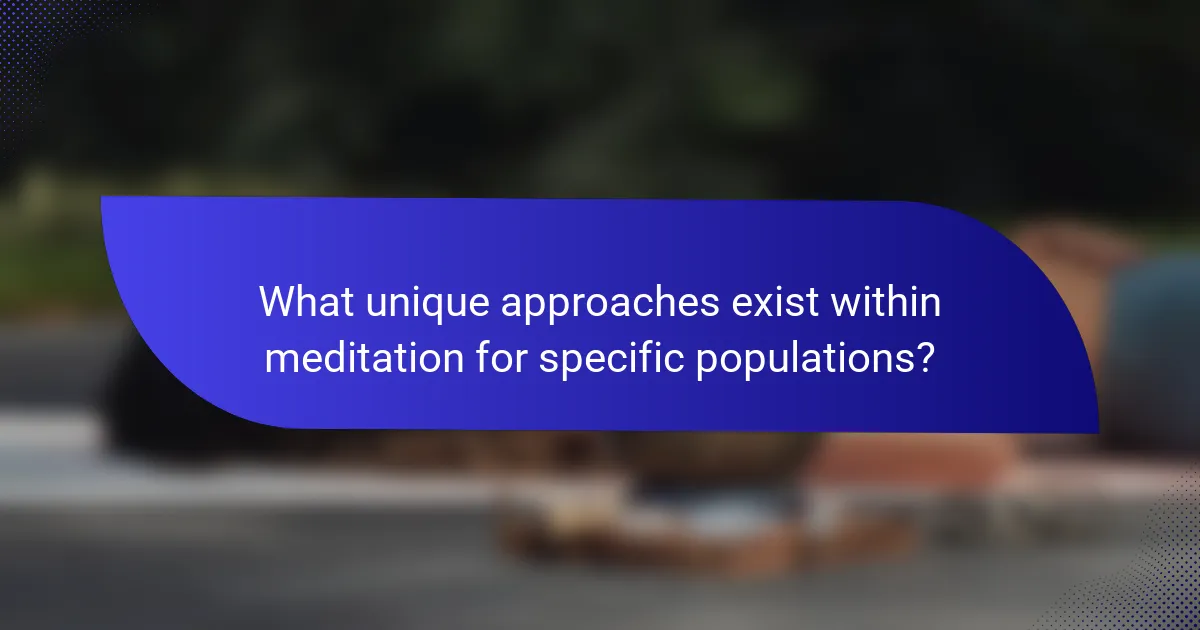
What unique approaches exist within meditation for specific populations?
Meditation techniques can be tailored to specific populations to enhance mindfulness, focus, and emotional balance. For instance, children benefit from playful, guided imagery sessions that foster creativity and attention. Seniors often prefer gentle, seated practices that promote relaxation and reduce anxiety.
Individuals with anxiety may find breath-focused techniques effective, as they help ground the mind and body. Those in high-stress occupations can use short, focused mindfulness exercises to quickly regain composure.
Additionally, unique approaches like trauma-informed meditation address the needs of survivors by creating a safe space for healing. Culturally adapted practices can resonate more deeply with diverse communities, enhancing the overall effectiveness of meditation.
How can meditation benefit students in academic settings?
Meditation significantly benefits students by enhancing mindfulness, focus, and emotional balance. It improves concentration, reduces stress, and promotes a positive mindset.
Mindfulness meditation helps students stay present, which boosts academic performance. Techniques such as breath awareness and body scanning cultivate focus and clarity. Regular practice can lead to emotional balance, allowing students to manage anxiety and improve resilience during challenging academic periods.
Studies show that students who meditate report higher levels of satisfaction and lower levels of stress. This practice fosters a supportive learning environment, enhancing overall academic success.
What adaptations are necessary for meditation in corporate environments?
Adaptations for meditation in corporate environments include creating designated quiet spaces, scheduling regular sessions, and incorporating brief mindfulness practices into meetings. These changes foster a culture of focus and emotional balance.
1. Designate quiet areas for meditation to minimize distractions.
2. Schedule regular meditation sessions to promote consistency.
3. Integrate short mindfulness exercises into meetings to enhance focus.
4. Offer training on various meditation techniques to accommodate diverse preferences.
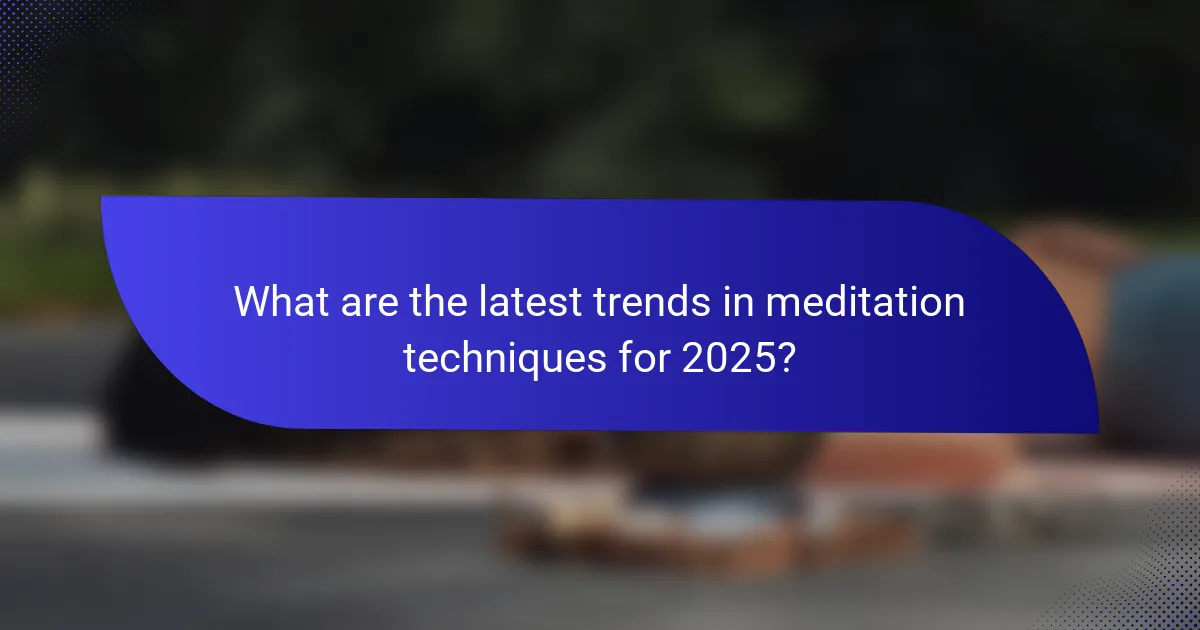
What are the latest trends in meditation techniques for 2025?
The latest trends in meditation techniques for 2025 focus on integrating technology, community engagement, and personalized practices. Virtual reality meditation is gaining traction, offering immersive experiences that enhance mindfulness. Mobile apps are evolving to provide tailored meditation plans based on user preferences and emotional states. Group meditation sessions, both online and offline, foster a sense of community, promoting emotional balance. Additionally, combining meditation with physical activities, such as yoga or tai chi, is becoming more popular for enhancing focus and overall well-being.
How is technology influencing modern meditation practices?
Technology significantly enhances modern meditation practices through apps, online classes, and virtual reality experiences. These tools provide guided sessions, track progress, and create immersive environments, making meditation more accessible. For example, meditation apps often feature personalized programs that adapt to user needs, fostering mindfulness and emotional balance. Additionally, wearable devices can monitor physiological responses, offering insights into stress levels and focus. This integration of technology into meditation encourages consistency and engagement, ultimately supporting users in achieving their mindfulness goals.
Which new meditation apps are gaining popularity?
Several new meditation apps are gaining popularity, enhancing mindfulness, focus, and emotional balance. Apps like Headspace and Calm continue to lead, while newer entries such as Insight Timer and Simple Habit offer unique features. Insight Timer boasts a vast library of guided meditations, appealing to diverse user needs. Simple Habit focuses on short sessions designed for busy lifestyles, promoting ease of use. These apps integrate various techniques, including breathing exercises and visualization, catering to users seeking mental clarity and emotional stability.
What emerging research is shaping the future of meditation?
Emerging research indicates that meditation techniques are evolving to enhance mindfulness, focus, and emotional balance. Studies show that integrating technology, such as apps and biofeedback devices, can optimize meditation practices. Research also highlights the benefits of combining traditional mindfulness techniques with modern neuroscience insights, improving emotional regulation and cognitive performance. Additionally, the exploration of group meditation dynamics reveals unique social attributes that foster deeper connections and shared experiences.
What expert tips can enhance your meditation practice effectively?
To enhance your meditation practice effectively, focus on consistency, technique variation, and environment. Establish a regular schedule to build a habit. Explore different techniques, such as guided meditations or body scans, to find what resonates. Create a calming space free from distractions to deepen your experience.